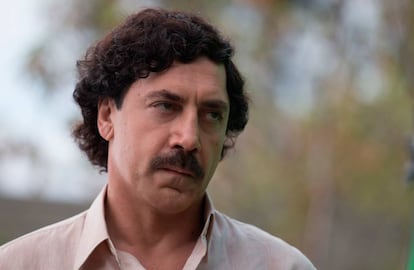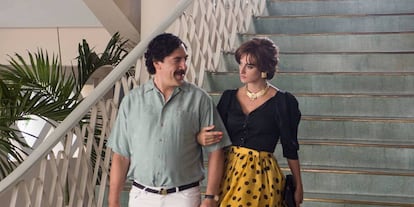Bardem’s Pablo Escobar: so good it even terrified his own wife
Oscar-winning Spanish actor transforms into feared Colombian drug lord in new movie

When the lights go out, nothing matters anymore. Not the weeks of shooting, not the struggle to raise funds, not the grueling promotional work. Everything magically evaporates and one is left alone with the screen – and with the faithful fans sitting in the adjacent seats.
“That instant when you say ‘let’s dream’ makes up for everything else. I get goosebumps just talking about it,” says Spanish actor Javier Bardem, showing his arm to prove it.
I was fascinated by the fact that he was a tremendous monster, but with contradictions
Javier Bardem
Granted, there is little room for pessimism here at the Venice Film Festival. The screening rooms are packed, and the screens enormous. No wonder Bardem was excited about his two movies being shown here: Mother!, from Darren Aronofsky, and Loving Pablo, from Fernando León de Aranoa.
But it may be more than just that. For a decade, both men had been trying to make a movie about the Colombian drug lord Pablo Escobar.
“I was first offered the role in 1998. I was fascinated by the fact that he was a tremendous monster, but with contradictions,” says Bardem, 48, who is known internationally for his roles in movies such as No Country for Old Men – which earned him an Academy Award – The Sea Inside and Skyfall.

The offers kept coming, but Bardem rejected them all. He says that the scripts always portrayed the father of drug trafficking like “a fairytale character.” Yet Escobar was as real as the terror that he sowed.
Virginia Vallejo knew this well. In her book Amando a Pablo, odiando a Escobar (or, Loving Pablo, Hating Escobar), this Colombian journalist explored her own sentimental relationship with the criminal lord. And while she was at it, she resuscitated the old León-Bardem project: this was the authentic vision that they’d been searching for. Bardem was now ready to get under the skin of the most dangerous drug trafficker in history.
“Pablo had always been under construction. I’d already chewed and digested it pretty well,” says the actor, adding that he was helped along by images he constructed about Escobar, such as viewing him like the drug lord’s own favorite animal, the hippopotamus – “A quiet, funny animal, but the most dangerous one in Africa.”
Bardem also noted Escobar’s constant need to get respect from others. “It drove him crazy; he brought an entire society to its knees, but he never managed it,” says Bardem.
I wasn’t seeing him, I was seeing the character. Later, I started counting the days until the torture would end Penélope Cruz
His transformation was such that even his own wife, the actress Penélope Cruz – who plays Virginia Vallejo in the movie – began to fear him. In one scene, Vallejo comes to Escobar for help. Both actors deploy a combination of onscreen chemistry and tension to create the best scene in the entire movie.
“I was really scared of him,” admits Cruz. “I wasn’t seeing him, I was seeing the character. Later, I started counting the days until the torture would end.”
Bardem confirms it. “We both had the creeps regarding that moment. We turned it into an exercise in imagination, to recognize which parts of it were not ours. Do they have something to do with us? Yes. Are they us? No. Let’s identify who they are, let’s make then hate each other, love each other, hit each other. And then let’s stop and go home, where we have two children waiting for us.”
And herein lies one of the hardest lessons for an actor with an acclaimed career behind him. “Before, characters used to affect me more, I would let them take me over,” he says. “Youth is reckless and has no sense of boundary. Right now I have no use for being the character 24 hours a day.” Even so, it took him months to get out of Uxbal, the terminal cancer patient he played in Biutiful, in a role that earned him a Best Actor award at Cannes.
Fernando León swears that Bardem was always one of the first people on the set, and “the last one to leave.” Bardem laughs and offers a self-analysis.

“I make dozens of mistakes. I see more and more of them all the time. But it’s also important not to slide into a false humility, because that can only lead to failure. You have to bring passion, patience and the desire to communicate something to the job. I do the best I can, and after that there will be all kinds of opinions that do not depend on me,” he says.
Once in a while, Bardem spends a month at a seminar led by Juan Carlos Corazza, his main tutor, in order to improve his acting skills. “There’s several students and we work with classical and modern texts,” he explains. “And you realize that you have the same problems as all other mortals.”
Perhaps the main problem for anyone who makes a living out of the movie industry is managing to make movies. And even an Oscar winner can run into a lot of problems.
For commercial reasons, the movie had to be filmed in English, not Spanish
“The worst part about cinema is the market, the need to make a commercial product,” adds Bardem. “Bringing a movie to port is a very radical thing. On the set, Fernando said, ‘I cannot recall any artistic expression that is so strongly shaped by the industry and by money.’ And he is absolutely right.”
Loving Pablo also ran into these hurdles, which determined that the movie had to be filmed in English, not Spanish.
But his new project will be in Spanish, even though the director is, in fact, from Iran. Asked about Asghar Farhadi, who is in Madrid for the shoot of Todos lo saben, co-starring Penélope Cruz and Ricardo Darín, Bardem’s eyes light up. “He doesn’t understand Spanish, but he understands people. He dissects you, he removes your mask, he forces you to share everything. There’s no way you can get a lie past him.”
For Bardem, it is also difficult to get past people on the street without being constantly recognized. “I miss being able to observe,” he confesses. “Those of us who work in this field feed on the act of watching and watching. And you can lose that.”
English version by Susana Urra.
Tu suscripción se está usando en otro dispositivo
¿Quieres añadir otro usuario a tu suscripción?
Si continúas leyendo en este dispositivo, no se podrá leer en el otro.
FlechaTu suscripción se está usando en otro dispositivo y solo puedes acceder a EL PAÍS desde un dispositivo a la vez.
Si quieres compartir tu cuenta, cambia tu suscripción a la modalidad Premium, así podrás añadir otro usuario. Cada uno accederá con su propia cuenta de email, lo que os permitirá personalizar vuestra experiencia en EL PAÍS.
¿Tienes una suscripción de empresa? Accede aquí para contratar más cuentas.
En el caso de no saber quién está usando tu cuenta, te recomendamos cambiar tu contraseña aquí.
Si decides continuar compartiendo tu cuenta, este mensaje se mostrará en tu dispositivo y en el de la otra persona que está usando tu cuenta de forma indefinida, afectando a tu experiencia de lectura. Puedes consultar aquí los términos y condiciones de la suscripción digital.









































